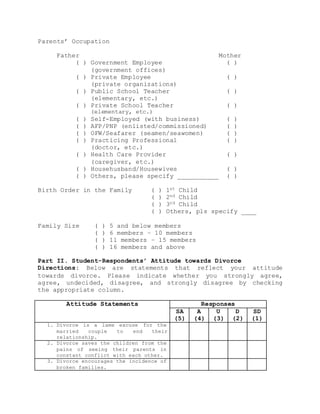Questionnaire to print
- 1. Directions: This is a questionnaire to determine your perceptions toward the 2010 Divorce Bill, itâs applicability to Certificate in Teaching students. This further contains three important parts. Read each item carefully and their corresponding instructions. Please answer as truthfully as possible. PART I. Student-Respondentsâ Personal Profile Directions: This section contains items about your personal background. Please fill in the needed information in the blank spaces provided per item and/or place a check (/) mark on the appropriate boxes. Name ___________________________________________________ (Optional) Age ___ Sex ( ) Male ( ) Female Civil Status ( ) Single ( ) Married ( ) Separated ( ) Widowed Average Monthly Family Income ( ) Php 1,000.00 and less ( ) Php 1,001.00 â Php 5,000.00 ( ) Php 5,001.00 â Php 10,000.00 ( ) Php 10,001.00 â Php 15,000.00 ( ) Php 15,001.00 and above Parentsâ Educational Attainment Father Mother ( ) Elementary Level ( ) ( ) Elementary Graduate ( ) ( ) High School Level ( ) ( ) High School Graduate ( ) ( ) College Level ( ) ( ) College Graduate ( ) ( ) With Units in Graduate Degree Programs ( ) ( ) With Degree in Graduate Programs ( ) ( ) Others, please specify ___________ ( )
- 2. Parentsâ Occupation Father Mother ( ) Government Employee ( ) (government offices) ( ) Private Employee ( ) (private organizations) ( ) Public School Teacher ( ) (elementary, etc.) ( ) Private School Teacher ( ) (elementary, etc.) ( ) Self-Employed (with business) ( ) ( ) AFP/PNP (enlisted/commissioned) ( ) ( ) OFW/Seafarer (seamen/seawomen) ( ) ( ) Practicing Professional ( ) (doctor, etc.) ( ) Health Care Provider ( ) (caregiver, etc.) ( ) Househusband/Housewives ( ) ( ) Others, please specify ___________ ( ) Birth Order in the Family ( ) 1st Child ( ) 2nd Child ( ) 3rd Child ( ) Others, pls specify ____ Family Size ( ) 5 and below members ( ) 6 members â 10 members ( ) 11 members â 15 members ( ) 16 members and above Part II. Student-Respondentsâ Attitude towards Divorce Directions: Below are statements that reflect your attitude towards divorce. Please indicate whether you strongly agree, agree, undecided, disagree, and strongly disagree by checking the appropriate column. Attitude Statements Responses SA (5) A (4) U (3) D (2) SD (1) 1. Divorce is a lame excuse for the married couple to end their relationship. 2. Divorce saves the children from the pains of seeing their parents in constant conflict with each other. 3. Divorce encourages the incidence of broken families.
- 3. 4. Divorce lessens the incidence of battery among married couples. 5. Divorce is an easy excuse for infidelity of either spouse. 6. Divorce produces problematic children. 7. Divorce promotes scepticism towards marriage. 8. Divorce increases the ability of the married couples to move forward and never look back on the failed marriage. 9. Divorce violates the religious tenet that âwhat has God put together, let no man put asunderâ. 10. Divorce encourages promiscuity among married couples. Part III. Student-Respondentsâ Perceptions towards the Applicability of the 2010 Divorce Bill Directions: Below are statements that reflect your perceptions relative to the applicability of the 2010 Divorce Bill along necessity of divorce, importance of divorce, urgency of divorce, validity of the grounds for divorce and reasonability of effects of divorce. Please indicate your perceptions by using the following five-point scale: 5 for very highly applicable, 4 for very applicable, 3 for moderately applicable, 2 for less applicable, and 1 for very less applicable. Indicators Responses VHA (5) VA (4) MA (3) LA (2) VLA (1) A. Necessity of Divorce 1. Divorce is expedient in times when married couples are exposed to violent tendencies of either spouse. 2. Divorce is needed when the married couple has already gone through a lot of legal means to save the marriage. 3. Divorce is necessary when, after all marriage counselling, the couple is still intolerable towards each other. 4. Divorce is a necessity when the married couple is already hurting each other physically, mentally and emotionally. 5. Divorce is needed when children are already traumatized by the constant bickering of their parents.
- 4. B. Importance of Divorce 6. Divorce is important to save the emotional well-being of the children. 7. Divorce is important to save the physical and mental well-being of the married couple. 8. Divorce is important to promote empowered women â women who are independent of their spouses for financial reasons. 9. Divorce is important to encourage married couple to express their sentiments towards marriage and not hold on to the false notion that their marriage has still hope. 10. Divorce is important to preserve the sanity of the children. C. Urgency of Divorce 11. Divorce is urgent when married couples are on the brink of murdering each other. 12. Divorce is urgent when there are already cases of battery among married couples. 13. Divorce is urgent when children are already suffering emotionally and mentally. D. Validity of the Grounds for Divorce 14. The grounds for divorce are valid when they are based on the Civil Code of the Philippines. 15. The grounds for divorce are valid when they are based on decided cases by the courts. 16. The grounds for divorce are valid when they are carefully thought of by the legislators before passing the bill into law. Thank you very much!




